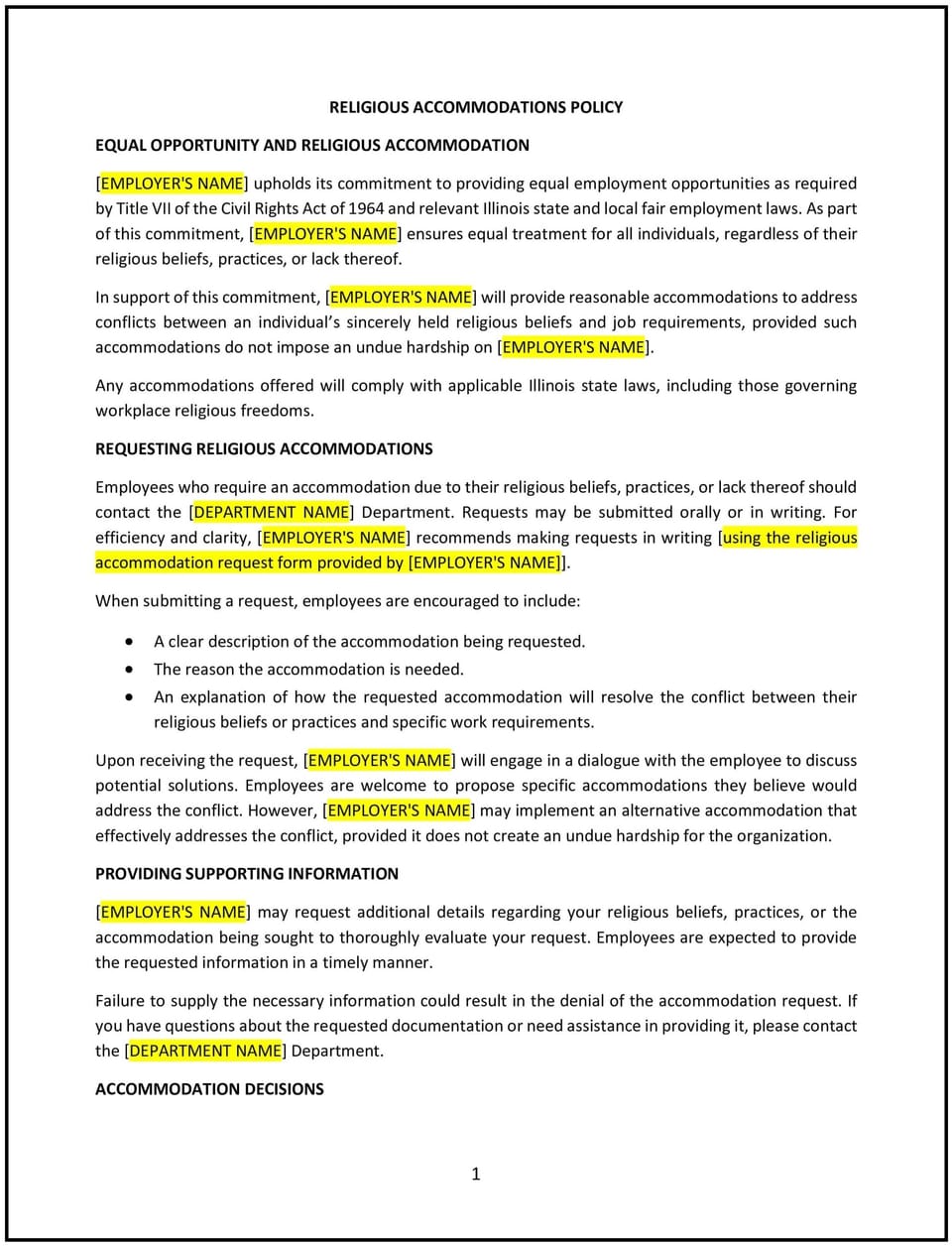Religious accommodations policy (Illinois): Free template

Religious accommodations policy (Illinois)
This religious accommodations policy is designed to help Illinois businesses support employees’ religious practices and beliefs while ensuring compliance with the Illinois Human Rights Act (IHRA) and Title VII of the Civil Rights Act. It outlines guidelines for requesting, evaluating, and providing reasonable accommodations for religious observances and practices.
By adopting this policy, businesses can foster inclusivity, protect employee rights, and promote a respectful workplace environment.
How to use this religious accommodations policy (Illinois)
- Define religious accommodations: Specify what constitutes religious accommodations, such as schedule changes, dress code exceptions, or time off for religious observances.
- Outline the request process: Require employees to submit written accommodation requests to HR or management, detailing the nature of the accommodation and its purpose.
- Establish evaluation criteria: Specify that requests will be evaluated on a case-by-case basis, considering the impact on business operations and the reasonableness of the accommodation.
- Emphasize non-discrimination: Reinforce that employees will not face retaliation, discrimination, or harassment for requesting or utilizing religious accommodations.
- Include examples: Provide examples of accommodations, such as flexible scheduling, prayer space availability, or modifications to uniform policies.
- Address undue hardship: Clarify that accommodations may not be provided if they impose significant difficulty or expense on the business, as outlined by law.
- Monitor compliance: Regularly review accommodation practices to ensure alignment with Illinois and federal laws.
Benefits of using this religious accommodations policy (Illinois)
This policy provides several benefits for Illinois businesses:
- Promotes inclusivity: Encourages a workplace culture that respects and supports diverse religious practices.
- Protects employee rights: Aligns with IHRA and federal laws to ensure employees can freely exercise their religious beliefs.
- Reduces conflicts: Provides clear procedures for addressing accommodation requests, minimizing misunderstandings.
- Enhances compliance: Helps businesses avoid legal risks related to religious discrimination claims.
- Builds trust: Demonstrates the company’s commitment to diversity and respect for individual beliefs.
Tips for using this religious accommodations policy (Illinois)
- Communicate the policy: Share the policy with employees during onboarding and include it in the employee handbook.
- Train managers: Provide training on evaluating accommodation requests and promoting inclusivity.
- Encourage early requests: Remind employees to submit requests as soon as possible to allow time for evaluation and implementation.
- Document accommodations: Maintain detailed records of accommodation requests, evaluations, and outcomes for compliance purposes.
- Update regularly: Revise the policy to reflect changes in Illinois laws or workplace dynamics.
Q: What types of accommodations are included under this policy?
A: Accommodations may include schedule changes, time off for religious holidays, prayer space availability, or modifications to dress codes.
Q: How should employees request religious accommodations?
A: Employees must submit a written request to HR or management, detailing the nature of the accommodation and its purpose.
Q: Are all accommodation requests guaranteed to be approved?
A: Requests are evaluated on a case-by-case basis. Accommodations may be denied if they impose undue hardship on the business, as defined by law.
Q: Can employees face retaliation for requesting accommodations?
A: No, employees are protected from retaliation, discrimination, or harassment for requesting or using religious accommodations.
Q: What should managers consider when evaluating requests?
A: Managers should consider the reasonableness of the request, its impact on business operations, and the legal requirements for providing accommodations.
Q: How are accommodations documented?
A: HR maintains records of all accommodation requests, evaluations, and decisions to ensure compliance and accountability.
Q: How often is this policy reviewed?
A: This policy is reviewed annually or whenever significant changes occur in Illinois or federal laws.
Q: Does this policy apply to all employees?
A: Yes, this policy applies to all employees, including part-time and temporary workers, as required by law.
This article contains general legal information and does not contain legal advice. Cobrief is not a law firm or a substitute for an attorney or law firm. The law is complex and changes often. For legal advice, please ask a lawyer.


